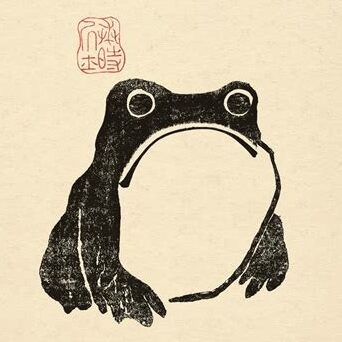[This post follows a happy long-distance coffee table incident with my fellow travellers. This is a genuinely difficult topic for me to write about, though. IANAT (I am not a teacher). I have some bits and pieces that may be worth your while, though.]
Enter (ethical) stage left
The fellow traveller: Normative ethics, unlike cellar door, is not considered by anyone to be the most beautiful phrase in the English language.
The mystic: The courtesy of a door opened.
Okay, okay, this may be overreaching. And there certainly is a lot of beauty in such ethical systems.
Normative ethics concerns moral rules or principles governing how we ought to act. The field focusses mostly on one of duty, virtue or consequences (giving deontological, virtue and consequentialist ethics respectively). For example, telling the truth could be considered an externally imposed duty, an inherent virtue, or a beneficial to society.
In Zen, in a way, compassion (an attempt at a “definition” is given in the footnotes^) is the primary duty, virtue and value. Compassion runs deep in Zen, it could be rendered as shared being.
Zen is stubbornly agile in how morality is constructed. Enlightenment predisposes practitioners toward ethical behavior. Zen emphasizes an intuitive approach from the practitioner’s deep experience of the situation. However, Zen can use moral scaffolding. The scaffolding is there but clinging to it or casting it away is missing the point. Is this just throwing up our hands? No, rather, it warns against being captured by the scaffolding or breaking it down.
Without fixed rules, can we be trusted? Can we trust ourselves? Can we even make correct moral decisions? Zen answers affirmatively, but proves this by demonstration.
A flash of flooding light
Action, in Zen, is like a thunderclap, an all-encompassing awareness of the present moment, universal compassion, do. This is not something special, or magical, merely paying attention just so (if anything, a not adding of something).
A moment unpassed, fateful, I water the vegetable garden.
Zen action is deeply human and varies from one master to the next. Action is a natural outflow of a deep awareness of all things. Rules and principles are part of the practitioner’s makeup, but these become skillful tools. We should treat rules with respect, as we do a friend. Denying the role of rules in our lives is worse than being limited. Using the “Dharma” to selfish ends is the worst kind of poison. Being attached to rules, or desiring to be unchecked, both emphases bring trouble. Rather not bound and not unbound, not in between either.
Autumn leaves line the streat, they crunch underfoot. I help the old lady up the stairs.
That was a mouthful, let’s take things slower.
At any moment, we are surrounded by the world with ourselves in the mix. All of these phenomena can be perceived just as they are with perfect equanimity and compassion. That sounds unlikely from a conventional perspective, but Zen isn’t suggesting something grand here, something quite humble instead. What if we simply perceive things as they are, and as they are inseparable from other things, and neither of these? Ha, again asking for too much? The good news is that we all do this already, but we do not realise this fully, that is where our trouble starts.
Pouring the tea
So work with me, we have this possibility of perceiving all phenomena with perfect compassion and equanimity (if we allow for the fact that the meanings of these terms can only point to the experience). Doesn’t this, in a conventional sense, seem like the perfect foundation for an ethical decision (to the extent a limited human can)? Compassion does not prevent mistakes, but it focusses the practitioner on all beings.
The Zen decision is always a compassionate decision, as an expression of the practitioner’s enlightenment.
Revisiting an earlier passage, does this mean there are no rules or principles? Zen puts emphasis on skillful action. It is what compassion brings, the compassionate outcome, just so. Of course rules and principles perceived can also be phenomena, also weighed in the balance of the thunderclap. Compassion can be a meta-rule, albeit one that operates by intuition (sometimes intuition calls on reasoning).* But we must “give up” rules before we can be trusted to wield them again safely.
Catherals, seen just so, becoming deer paths.
Cathedrals do provide shelter in a world of ought, but the deer path helps us to navigate the world that is and cut across country if compassion demands it. A cathedral can isolate us from ones needing help outside in the unjust world.
We could talk about valiant compassionate acts like saving the downtrodden, but Zen equally applies compassion to seemingly insignificant acts. Serving the tea just so, sweeping the dust as one is, or reading a blog post with attention. This isn’t a bug, it is a feature, this is exactly why we should be paying attention. Attention.
Ask yourself, what is going on here, why are these people taking these acts so seriously? What am I missing, or what am I adding?
How could Zen be so particular about action, and yet embody perfect freedom? I don’t want to tie your hands here with an ill-chosen word. Perhaps the most beautiful thing about a cellar door lies in how you open it just so.
The Detective: <having overheard the coffeeshop banter …. reflecting … and scribbling notes> Nothing extra, on top of what?
Footnotes
^ [added for a friend] The meaning of compassion in Zen is difficult to convey because, in a sense, it is the whole of the teaching. We call it great compassion to distinguish it from conventional compassion (feeling together with another) or empathy (feeling for another). It is much more fundamental, before emotion (though, in humans, it can certainly stir emotions).
Great compassion describes a kind of shared being directly experienced as fundamental to consciousness itself. Not twoness, not oneness. Once experienced (though in a sense it cannot not be experienced), it becomes axiomatic. But what is it?
In a way, it is simply letting things be exactly as they are. Letting the candle flame burn brightly while you watch in silence. Nothing special. And yet, when not layering it with other things, you are not two.
No words, I contemplate the flame.
My husband’s day was poetry.
Without quick access to this experience, it might be worthwhile to explore what the consequences are for sentient beings. If great compassion is universal, how should we act? Even if we take a naïve view of what shared being means, we quickly arrive at the golden rule.
Think about “do unto others as you would have them do unto you”. If you emphasize self, this is a noble maxim but a maxim. If there is oneness, it becomes “Act toward all beings as yourself, for they are not other than you.” or “Love the neighbor as your very self, for there is no separation in God.” This is not without its problems, but it is less heuristic than the dualistic formulation, it is more of a fundamental outflow of simply being.
Now, Zen doesn’t teach oneness or twoness, not one-sidedly. What if the world lit up in a kaleidoscope of being and shared being? What would that mean? What if that experience is of this moment as it is right now, accessible to anyone, and not some shrouded or extreme state?
Can you see that, without digging deeper into what compassion means, it would make you a more ethical person regardless of your faith (or non-faith)? It is a gift already given, it is grace. And yet this gift needs to be uncovered or fully accepted.
The Detective: <recording> Diane, once I can be trusted to leaven bread just so, will I be welcomed into the secret society of everything? Will I make my way through the world with bliss bestowing hands?
* Can we square Zen ethics with normative ethics? Is there some relationship? Perhaps. This is a bit of an experimental section, remember your potted plants need you.
To the extent that it is Deontological, Zen has compassion as an absolute duty, though one so deeply ingrained it feels like second nature, so deeply ingrained it feels exactly just like the way things are right now. It is compassion a duty required from without or within, or no duty at all? I bring my coworkers a custard cake. A bird sings as the bus approaches.
To the extent that it is a virtue, Enlightenment is something to be cultivated (although in a sense it is something we already have that we practice to express, unlike virtues that can be absent).
To the extent that it is consequentialist, Zen is deeply pragmatic, but it doesn’t try to optimize fixed value functions, it is intuitive.
So, in some sense, Zen unifies these approaches in a minimalist way. Where it transcends them is the actual moment of action. Do I follow the deer path, slightly worn by the feet of passing travelers? Or do I cut across country to rescue the stricken hiker? Flash. The brush is thick, the rain pours. There is no difficulty where compassion leads.
This is a moment of deep intuition whose outcome depends on the practitioner themself, acting through the lens of great compassion. Again, this could even use rules if the practitioner intuits them to be skillful at a particular moment, just as they might use a hose to water the garden.
As a temporary conclusion, Zen ethics are compatible with normative ethics to the extent that the great heart of compassion is a principle and a virtue to be cultivated. In that it is deeply pragmatic. It is also none of these.
Expressing this great heart in all we do is the norm, keeping in mind that this norm is deeply contextual while it may use fixed rules if they are deemed skillful in the moment. Zen ethics transcends normative ethics at the moment of action, all bets are off, it is lightning cutting through the moment. There is no moment of conventional rule evaluation, but planning could just be the compassionate action of the moment!
Experiencing the moment perfectly, what naturally flows from the embodied great heart?
No lightning, no moment. Weather still comes.
Subscribe to blog:


